New China Crisis As ARD Reveals That 23 Swimmers, Zhang, Wang & Qin On The List, Tested Positive For Sun’s 1st-Offence Drug
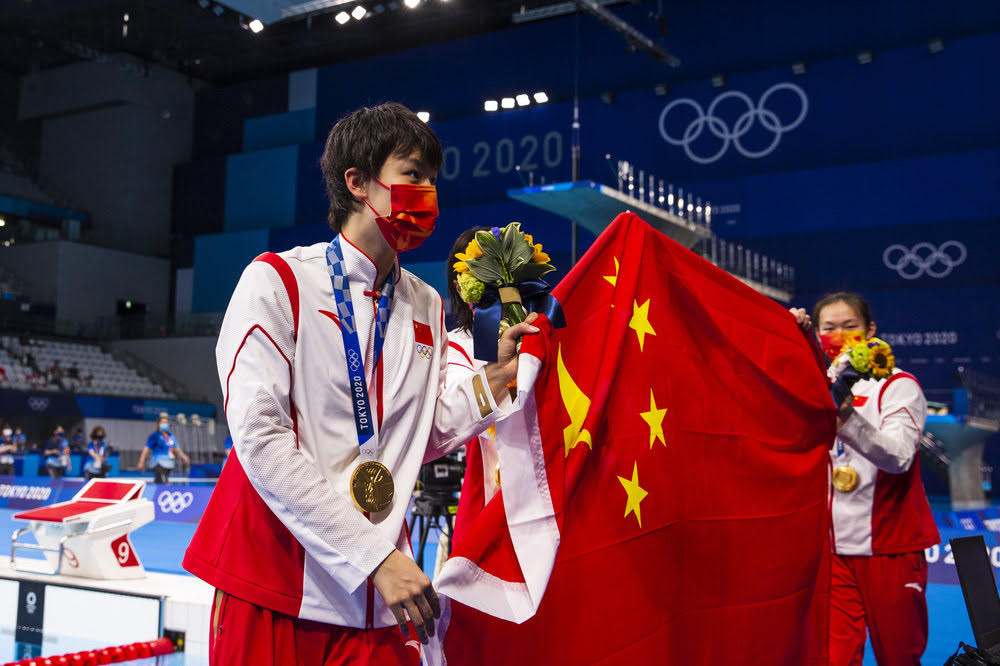
On the way to the Tokyo Olympics, 23 China swimmers tested positive for the same banned substance responsible for Sun Yang‘s first offence but were let off and cleared to race in Tokyo because world governing bodies agreed with an assessment from Chinese authorities that the tests had been contaminated months earlier.
Documents unearthed by the ARD Anti-Doping team at the leading German broadcaster, confirm that the 23 swimmers, including the nine who claimed medals in Tokyo, topped by the Zhang Yufei and her two golds and two silvers, tested positive for trimetazidine, a powerful heart booster, at a training camp held months the Tokyo Games.
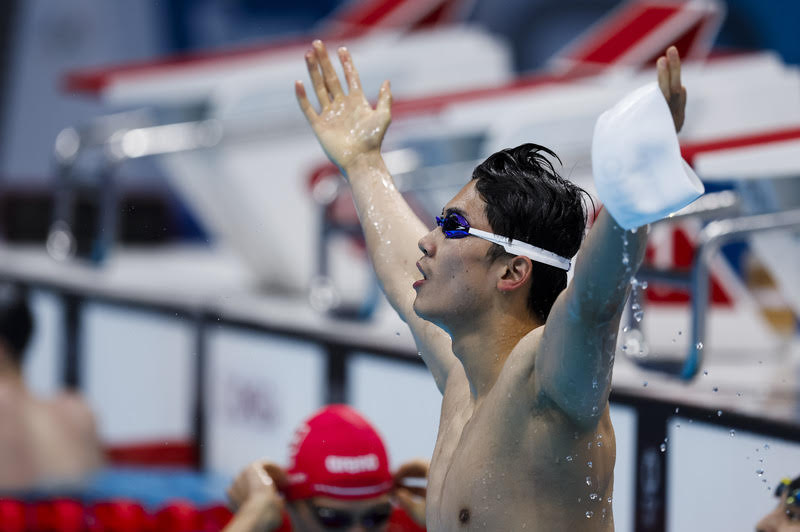
A report by Chinada, China’s anti-doping authority, claimed that the swimmers had unwittingly taken the drug in trace amounts from a tainted food supply and that no action was warranted, a finding that some experts consider implausible.
Chinada investigators reported that traces of the substance were found in the kitchen of a hotel that the team had stayed at during a domestic competition in late 2020. However, the report offered no explanation of how the substance — a prescription drug developed to treat heart disease that — found its way into a commercial kitchen.
Among those who tested positive were Wang Shun, who claimed gold just 0.28sec ahead off Britain’s Duncan Scott in the 200m medley, and Qin Haiyang, who did not excel in Tokyo but has since become the favourite to topple Britain’s 2016 and 2021 Olympic champion Peaty in the 100m breaststroke at Paris this summer and claim gold in the 200m as well.
At the time the positives were reported, the International Testing Agency stepped up checks in China at a time when the COVID pandemic had significantly reduced the number of international controls being made on athletes in China.
Wang is only the second Chinese man ever to win gold in the Olympic pool, after the disgraced Sun Yang*, who’s suspended for three months after testing positive for trimetazidine in 2014, and was banned for four years and three months following a Sunday Times report revealing the details of a second WADA Code violation in 2018, four years after he tested positive for a banned substance but was handed a retrospective, lenient, three-month suspension that was never actually served.
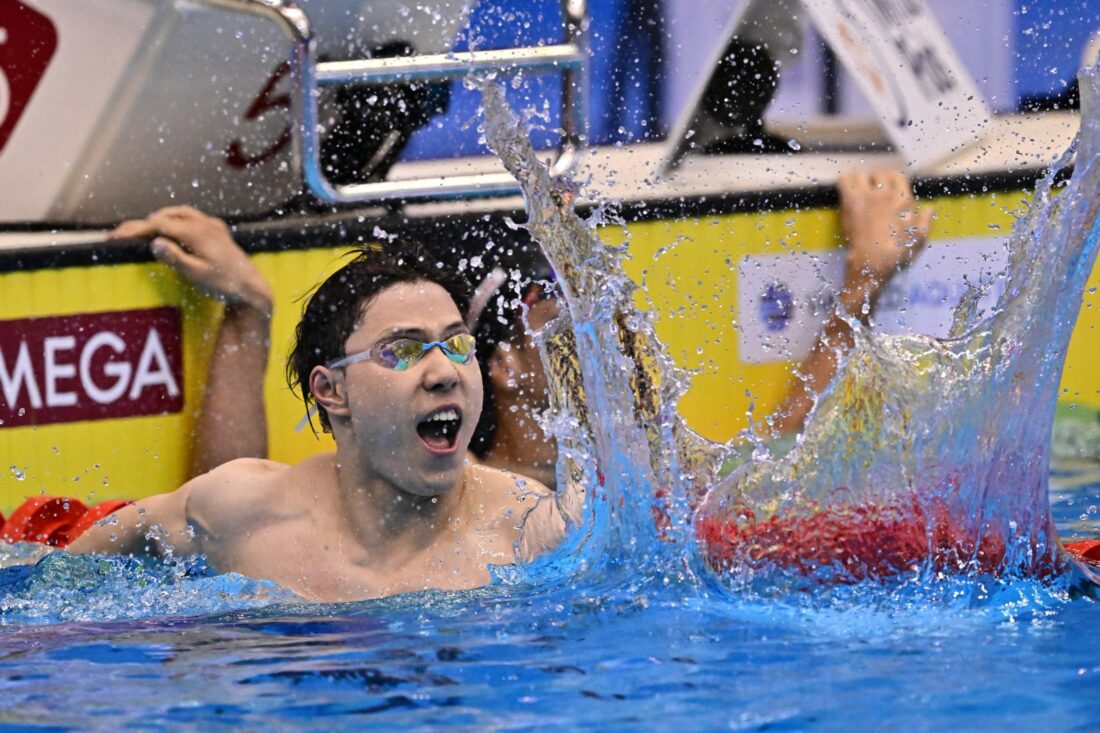
Qin broke the 200m World record last July in a week in which he dominated events at the World Championships in Fukuoka and became the first man ever to win all three breaststroke titles, over 50, 100- and 200m.
At the time, State of Swimming drew criticism for questioning the provenance of performance seen in a 24-year-old on a pathway like no other in his sport. For example:
Every experience I have had in nearly 35 years of covering swimming as a journalist for The Times and Sunday Times tells me that that those questions were not only legitimate but essential.
One award-winning source today urged WADA “to support the fullest investigation of these reports … we must not be frightened to unearth the truth.” Addressing “those responsible”, the source told SOS:

“How devastating: if people’s honest efforts and dreams are being robbed by those of you who choose to try and beat the moral code of sport, you should be ashamed. And to the athletes and coaches involved, ask more questions and know more about the systems that are being laid out for you. Athletes: know what’s being put in your body and what you are taking and who is giving you it.”
Such things as those exposed by ARD are revealed because whistleblowers speak to journalists – because they have not faith in sports authorities to be transparent and understand the devastating impact on athletes such events have, athletes clean first and foremost, athletes working in unacceptable conditions next. The questions flow and flow (and a commentary to follow as the story develops).
Guardians Of World Sport Say China ‘Contamination’ Story Meant ‘Threshold To Open An Investigation Not Met’
The World Anti-Doping Authority, the International Testing Agency and World Aquatics all agreed with Chinas’s contamination explanation, it has emerged as a result of an investigation at the well-funded and supported ARD unit run by journalists Hajo Seppelt and Nick Butler.
World Aquatics said it was “confident that these AAFs [adverse analytical findings] were handled diligently and professionally, and in accordance with all applicable anti-doping regulations.”
WADA is among authorities coming under fire over ARD’s revelations at a time when its latest mantra is “Raising the game for clean sport” but WADA’s Director of Intelligence and Investigations, Gunter Younger, was quoted by News Corp newspapers in Australia as saying: “At every stage, WADA followed all due process and diligently investigated every lead and line of enquiry in this matter.”
He added: “The data held by us clearly showed that there had been no attempt to hide the positive tests as they had been reported in the usual way by the Chinese authorities. Therefore, based on the available information and a lack of any credible evidence, the threshold to open an investigation was not met.”
In the latest in a long list of hidden China positives down the decades, the “Adverse Analytical Findings” include the swimmers who claimed gold in the women’s 4x200m freestyle relay in World record time at the Tokyo Games. Reports that World Aquatics will strip the China 4x200m of its Tokyo Gold are both erroneous and illogical: action would be against all and any of the 23 involved – or none. World Aquatics has confirmed that those reports are false.
That relay focus is nothing new, as SOS will soon reveal with some more devastating and to-date untold news from the 1990s and the source of a cultural crisis in China sport that is far from over despite assurances from authorities sin the country that they are playing by the same rules as everyone else.
The Trouble With TMZ & Letting Anyone Off
WADA and FINA (now WA) were both notified about the positive tests and agreed to agree that the adverse results were caused by contamination. Normally, anyone who fails a drugs test receives some level of sanction under the sport’s strict liability policy, which states that athletes are responsible for any banned substance found in their body, regardless of how it got there.
While it is not unusual for anti-doping authorities to hand down reduced penalties to athletes who test positive through no fault of their own, it is exceptionally rare that they get let off scot-free, even in the case of trimetazidine.

Also known as TMZ, trimetazidine carries heavy penalties for anyone caught with it in their system. One of the most high-profile recent cases involved the Russian teenage figure skater Kamila Valieva, who tested positive for trimetazidine two months before the 2022 Beijing Winter Olympics.
Russian officials did not immediately disclose the results so that she could compete in China but after a long inquiry, she was given a four-year ban earlier this year and stripped of the gold medal she won in the team competition.
Valieva’s case failed even though she used precisely the same argument as the Chinese swimmers: lawyers for the Russian figure skate, 15 when she tested positive, argued that contamination from the trimetazidine her grandfather was taking caused the positive test in a sample taken weeks before the Beijing 2022 Olympics got underway.
In 2018, US swimmer Madisyn Cox was given a reduced six-month ban after she tested positive for TMZ, despite the fact she was able to prove it was accidental by tracing the drug back to a batch of contaminated vitamins.
Even Sun Yang was handed a three-month ban for a positive test for the same drug in 2014, that leniency extended because Chinada said that it had not issued a Chinese version of the 2014 WADA Code with TMZ included by the time Sun tested positive in May. Whistleblowers have subsequently unearthed a Chinada Chinese version of that code dated January 2014.
ARD’s story was first picked up by News Corp in Australia and the New York Times, which has also worked on the story in the lead-up to ARD’s investigation going live. The German crew noted that in 2021, the ITA and the US Anti-Doping Agency (USADA) both expressed their concerns about the way the Chinese positives were reported and called for further investigations.
The handling of the case has also prompted CEO of USADA Travis Tygart to tell the NY Times: “This appears to be a devastating stab in the back of clean athletes and a deep betrayal of all the athletes who compete fairly and follow the rules. All of those with dirty hands in burying these positives and suppressing the voices of courageous whistle-blowers must be held accountable to the fullest extent of the rules and law.”
He also made this damning assessment:
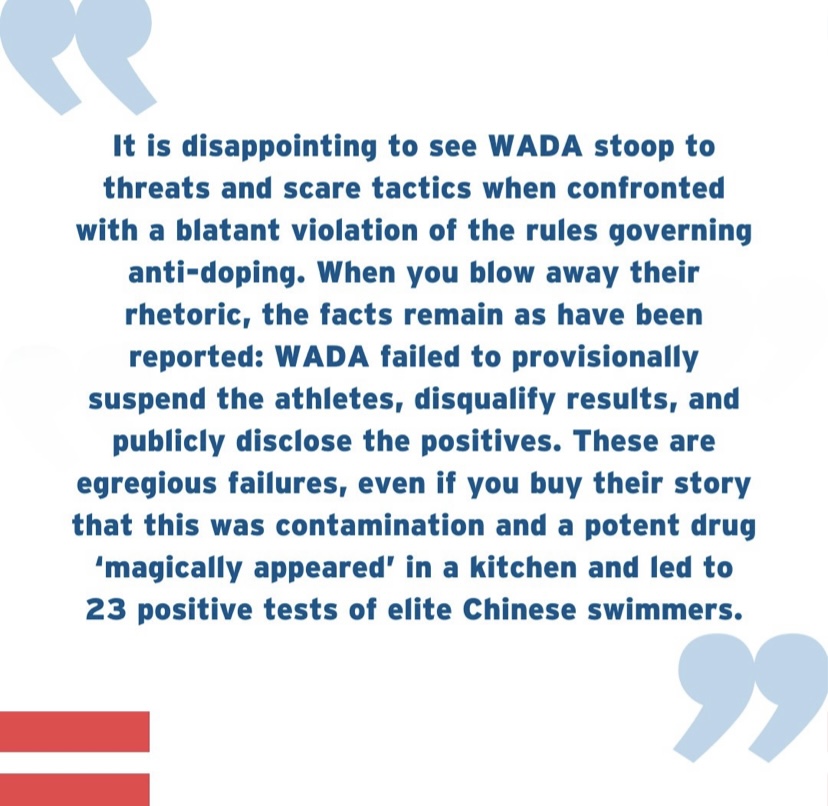
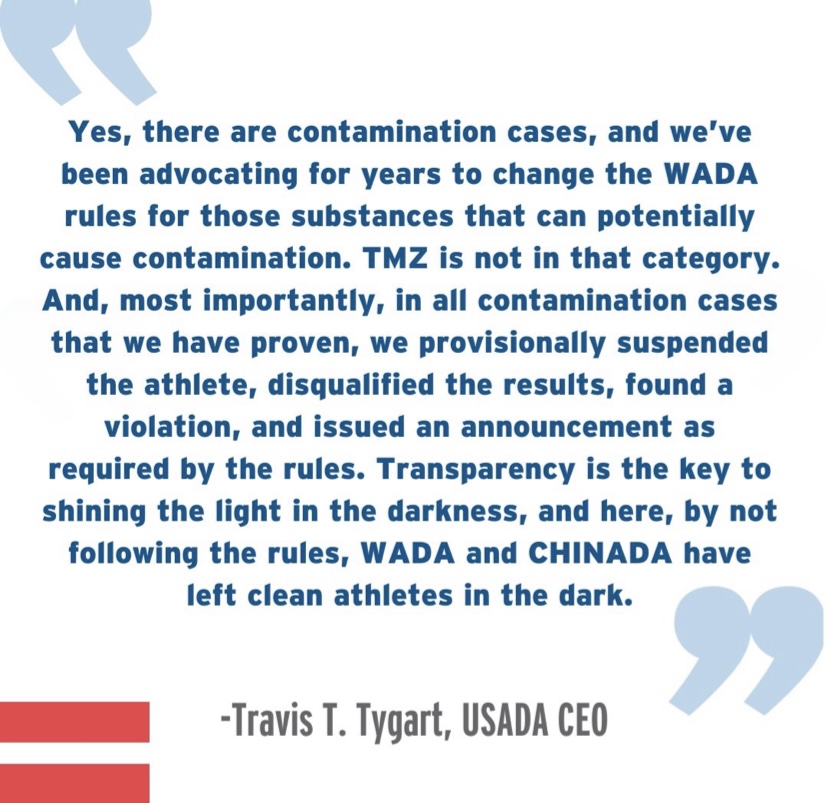
And this similar statement from USADA:
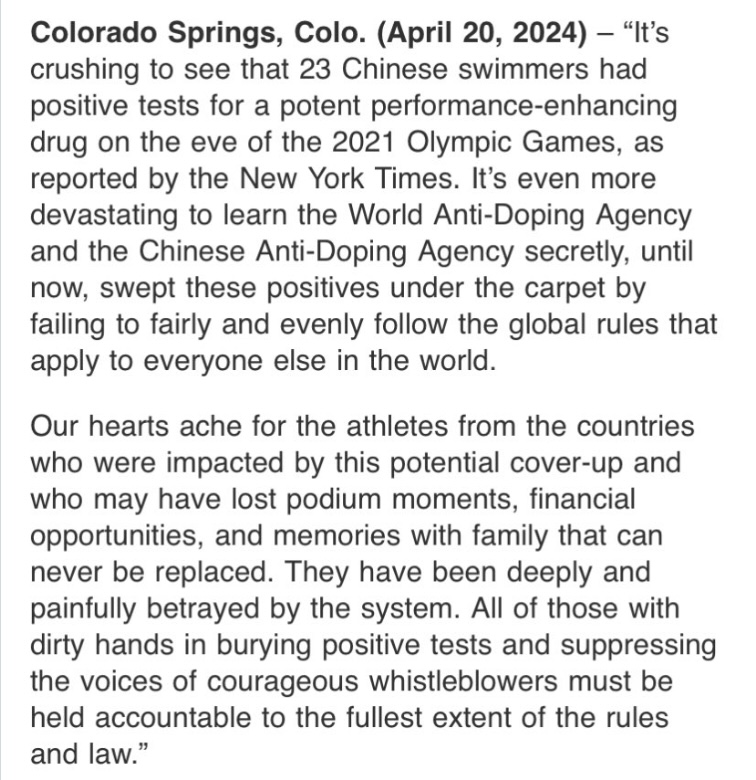
WADA responded with this statement, threatening legal action against Tygart but offering neither details nor substantive description of what it actually meant by „all available scientific evidence and intelligence, thoroughly gathered, assessed and tested by leading anti-doping experts“.
The ITA asked WADA in 2022 whether the TMZ sample results had been misreported. Then last year, USADA, the American anti-doping authority, emailed WADA calling for a fresh investigation to ensure there was no cover up.
In a statement to News Corp, the ITA said: “The International Testing Agency (ITA) can confirm having received confidential and anonymous information in the summer of 2021 regarding a number of positive results affecting a group of Chinese swimmers following some testing activities performed by CHINADA in the first half of 2021.
“In parallel to a full assessment of the information received that remains active, the ITA conducted many targeted follow-up testing missions in 2021, 2022, 2023 and up until today. This is a standard procedure that the ITA puts in place whenever it receives confidential information which may impact the integrity of our partners’ sport competitions.”
World Aquatics confirmed that its Doping Control Board looked into the results but was satisfied everything was done by the book. It told News Corp: “Materials relating to the source of the AAFs were subject to independent expert scrutiny retained by FINA. World Aquatics is confident that these AAFs were handled diligently and professionally, and in accordance with all applicable anti-doping regulations, including the World Anti-Doping Code.”
WADA’s Senior Director of Science and Medicine, Professor Olivier Rabin, said their own enquiries into the case supported the Chinese ruling that no violations occurred.
“The WADA Science Department reviewed this case thoroughly in June and July 2021. Indeed, we even sought pharmacokinetic and metabolism information from the manufacturer of TMZ in assessing the plausibility of the contamination scenario that was presented to WADA. Ultimately, we concluded that there was no concrete basis to challenge the asserted contamination.
“Indeed, the contamination scenario was further supported by the combination of the consistently low concentrations of TMZ as well as no doping pattern with several athletes presenting multiple samples collected over the course of several days which fluctuated between negative and positive (and vice versa).”
The Trouble With China

That, say critics, does not take into account China’s troubled history, including hiding positives, seeking to clean swimmers up with diuretics when testers come calling and tampering with evidence.
Chinese swimmers accounted for almost half of all the positive doping tests in world sport during the 1990s, which ended with more than 100 adverse findings, including many only reported after insiders blew the whistle.
Among the most infamous of the cases unfolded in 1994 and 1998. Thanks to the work of world-leading criminal pathologist Prof. Malcolm Cameron, seven of the 11 China athletes caught with steroids and other banned substances in their bodies when stepping off the plane for the 1994 Asian Games in Japan were swimmers.
There were caught weeks after Chinese women had dominated at the World Championships with the mind of medal hauls common in the era of GDR doping that preceded the sharp rise of performance in China.
On the way to the 1998 world championships in Perth, Chinese breaststroker Yuan Yuan was caught at Sydney Airport with 13 vials of human growth hormone in her bags, enough to have supplied the entire team for their three -week stay in Australia. Four of her teammates later tested positive for diuretics and several coaches were suspended by China. And those are the potted, mild versions of the China Crisis of the 1990s.
Expect more on this story …
I was looking for more information on this, I knew you’d have it Craig. Thank you.
Thanks Sippy. More to come … 🙂
Great work Lordy. Makes me both angry and dismayed at the same time. Why test? To catch cheats. Ok- so what do we do when we find them? Nothing – it’s too difficult. What a disgrace.
Thanks, Wayne. And 🎯